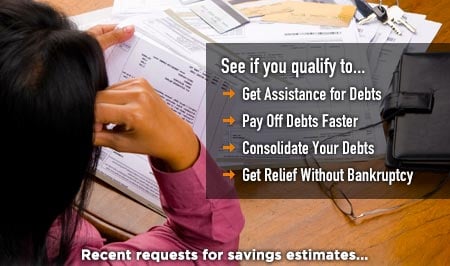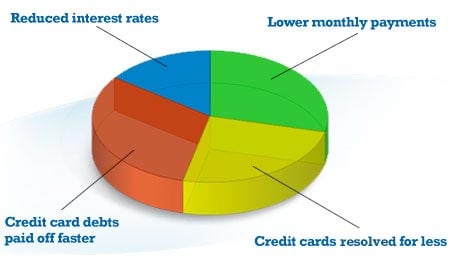
Could Debt Consolidation Without a Loan Help You Get Out of Debt Faster?
Are you experiencing financial difficulties and struggling with your high credit card debt payments and considering a loan? If so, you are not alone. Many residents in Virginia as well as in other states are also overburdened with credit card debts and other types of unsecured debts, such as medical bills, department store charges, gas charges, and personal loans. Fortunately, for you and those consumers, there are many debt relief options available -- including debt consolidation or a debt management plan (DMP), credit counseling, debt settlement, debt consolidation loans, or even bankruptcy.
For many consumers, debt consolidation, debt consolidation loans, and debt settlement are popular alternatives to bankruptcy -- which can certainly relieve many types of debts and provide a fresh start, but keep in mind that bankruptcy has a more damaging and longer lasting impact on one's personal credit.
That's why it's a smart move to compare all your debt relief options and see which one is right for you and your family. To begin, simply answer a few, basic questions to get a free debt relief analysis and savings estimate -- at no cost to you.
Will a Debt Consolidation Loan Help?
Depending on their financial situation, many consumers get debt consolidation loans to help pay off their credit cards and get relief from their debts. While this approach may provide a measure of relief for some, it is wise to approach debt consolidation loans carefully as this type of loan generally requires you to put up your home (or another asset or property) as collateral. In addition, there is typically no credit counseling involved with a debt consolidation loan.
Therefore, if you default on the terms of your loan, you could very well be putting your home in jeopardy. Another risk to consider: Many consumers who get debt consolidation loans typically do not have the discipline to stop using their credit cards, and eventually, they start accumulating new, high-interest charges. As a result, many of these consumers end up dealing with new credit card debts on top of their personal loan. Under this scenario, a debt consolidation loan has generally made their debt crisis go from bad to worse.
How Does Credit Counseling Work?
Debt consolidation through credit counseling, on the other hand, is yet another possible debt relief solution for many consumers, particularly those with multiple credit cards or unsecured debts (like medical bills, retail store charges, or utilities). What debt consolidation involves is combining, or consolidating, high-interest credit card and unsecured debts into a single, more manageable, and more structured monthly payment made to a credit counseling agency.
When you enroll in a debt consolidation program, credit counselors review your debts, finances, and overall ability to pay your debts. When they understand your financial situation, credit counselors or debt relief specialists will often come up with a strategy designed help you reduce your debts. What this typically involves is submitting proposals, on your behalf, to your individual creditors asking for reduced interest rates, or the waiving or elimination of late fees and other penalties. Creditors that agree to these proposals are placed into the debt management plan.
The goal of debt consolidation is to provide you with ONE, easier-to-manage, and more structured payment plan so that you can manage your debts sooner than if you only continued to make the minimum monthly payments at higher interest rates. In comparing debt consolidation with debt consolidation loans, debt consolidation through credit counseling may be preferable form of relief for those individuals who want a repayment plan that's more structured and could allow them to pay off their debts at a more accelerated and predictable pace.
How Much Could I Save with Debt Consolidation?
Since every individual's situation is unique, no one could predict with certainty how much money you can save with debt consolidation. However, the amount of savings generally depends on how much your original debt is, the current interest rates that you are paying, and any late fees or penalties. Keep in mind that with a debt consolidation program, you will be provided with a simplified and more lenient payment plan that is designed to help you pay off your debts at a pace that you can manage instead of continuing to make the minimum monthly payments at higher interest rates.
As you explore your debt relief options, make sure that you do your due diligence, regardless of which option you end up choosing. It is generally recommended to review a company's Better Business Bureau (BBB) rating to find out the company's track record of customer service.
The bottom line is, if you are overwhelmed with credit card and unsecured debts, there is a debt relief option available to help you create a game plan towards reducing your debts and regaining control of your finances. Take the first step by getting a free debt relief analysis and savings estimate -- today from VirginiaDebtRelief.org.





















